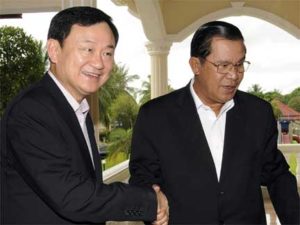 The extent of change in a country’s foreign policy during the transition to a new regime can sometimes be striking. It is a proposition which will be played out in Thailand over the coming weeks and months as the new Pheu Thai-led coalition begins to govern following its electoral victory last week. The result of the vote was not just a repudiation of economic policy by the rural majority but, elucidated by one Thai civil servant, also served to abrogate nearly three years of failed foreign policy exhibited by Prime Minister Abhisit Vejjajiva and his cohorts. Diplomatically, Thailand’s relationship with global and regional hegemons – the United States, China, and Russia, all fellow members of the Asia-Pacific Economic Cooperation (APEC) – will most likely remain unchanged. However, relations between Thailand and Cambodia is where observers can expect to see quite a salient divergence from that of the previous regime and the one usurping it.
The extent of change in a country’s foreign policy during the transition to a new regime can sometimes be striking. It is a proposition which will be played out in Thailand over the coming weeks and months as the new Pheu Thai-led coalition begins to govern following its electoral victory last week. The result of the vote was not just a repudiation of economic policy by the rural majority but, elucidated by one Thai civil servant, also served to abrogate nearly three years of failed foreign policy exhibited by Prime Minister Abhisit Vejjajiva and his cohorts. Diplomatically, Thailand’s relationship with global and regional hegemons – the United States, China, and Russia, all fellow members of the Asia-Pacific Economic Cooperation (APEC) – will most likely remain unchanged. However, relations between Thailand and Cambodia is where observers can expect to see quite a salient divergence from that of the previous regime and the one usurping it.
Discord between the two states reached its worst point in years this past April when their respective militaries clashed on the border over the status of the ancient Hindu temple ruins of Preah Vihear. The fighting resulted in eighteen deaths, on both sides, with dozens more wounded. After military commanders agreed to a ceasefire in May, the dispute was referred to the International Court of Justice (ICJ) for adjudication. An injunction on the matter is expected to be delivered by July 18th.
The Abhisit administration’s perspective on the conflict in large part reflected the views held by the fiercely nationalist People’s Alliance for Democracy (PAD), the Yellow Shirts who staged anti-government street demonstrations in 2008. The PAD found the stance taken by the pro-Thaksin Shinawatra government, led by Prime Minister Samak Sundaravej, to be an intolerable insult to Thai pride; Samak supported Cambodia’s push to list the temples as a UNESCO World Heritage Site, under Cambodian administration.
A Pheu Thai victory may, in effect, reset the Thai-Cambodian relationship and mollify the hostility which had underpinned it since 2008. As The Diplomat’s Luke Hunt reported last week, Cambodian Foreign Minister Hor Nam Hong said of Pheu Thai’s big win: “It’s true, we can’t hide that we are happy with the victory by Pheu Thai Party in Bangkok.”
The lame duck Abhisit administration, which will still be in office when the ICJ makes its ruling on the dispute, has stated that it will comply with any decision the court decrees. That statement is sure to acerbate the Yellow Shirts even more, still abashed after the resounding electoral results last week. But it should be a significant step towards peacefully resolving the differences between the two countries. As articulated by Cambodian Prime Minister Hun Sen last week, a Pheu Thai government will mark “a new era of cooperation.”